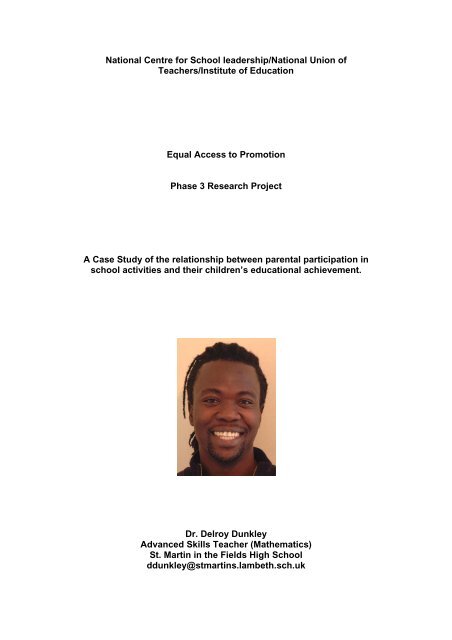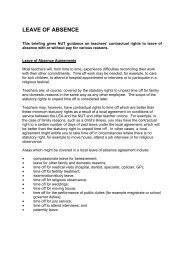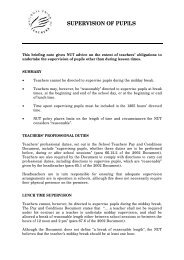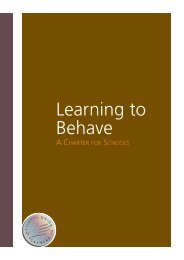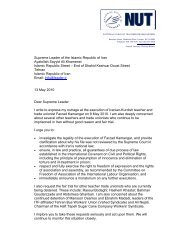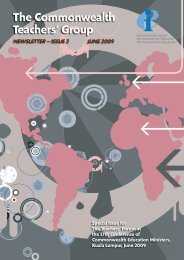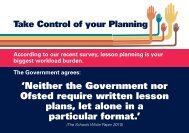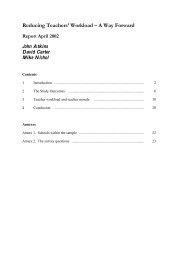Delroy Dunkley - National Union of Teachers
Delroy Dunkley - National Union of Teachers
Delroy Dunkley - National Union of Teachers
You also want an ePaper? Increase the reach of your titles
YUMPU automatically turns print PDFs into web optimized ePapers that Google loves.
<strong>National</strong> Centre for School leadership/<strong>National</strong> <strong>Union</strong> <strong>of</strong><br />
<strong>Teachers</strong>/Institute <strong>of</strong> Education<br />
Equal Access to Promotion<br />
Phase 3 Research Project<br />
A Case Study <strong>of</strong> the relationship between parental participation in<br />
school activities and their children’s educational achievement.<br />
Dr. <strong>Delroy</strong> <strong>Dunkley</strong><br />
Advanced Skills Teacher (Mathematics)<br />
St. Martin in the Fields High School<br />
ddunkley@stmartins.lambeth.sch.uk
School Context<br />
St. Martin in the Field High School is a 11-19 state comprehensive, multi<br />
ethnic, Church <strong>of</strong> England Girl School, located in Lambeth, in the south west<br />
<strong>of</strong> London. The school has a population <strong>of</strong> over 800 students. Its last GCSE<br />
results was 76% 5 A* to Cs and 56% inclusive <strong>of</strong> mathematics and English. St<br />
Martins is a very inclusive school, which does it very best to ensure that all it<br />
students achieve their full potential. The last OFSTED inspection (2007)<br />
graded the school as outstanding.<br />
The school takes its partnership with parents very seriously. It believes that<br />
continued communication between school and home is <strong>of</strong> vital importance if<br />
the girls are to make the most <strong>of</strong> the opportunities <strong>of</strong>fered at St. Martin’s. The<br />
school currently <strong>of</strong>fers the following formal and informal activities aimed at<br />
encouraging parental involvement in every aspect <strong>of</strong> their daughters’ school<br />
life.<br />
• Parents evenings (formal for<br />
each year cohort)<br />
• C<strong>of</strong>fee morning (informal<br />
context as parents set agenda<br />
in each year group)<br />
• Laptop club (parent training in<br />
basic laptop skills)<br />
• Chicken and chat (informal<br />
meal with all parents)<br />
• Cultural celebration<br />
• Cabaret<br />
• Year 6 interview with parents<br />
• Year 9 Option Evening<br />
• Whole school fun run<br />
• Gospel concerts<br />
• School productions (Plays,<br />
Musicals, Christmas Pantomime etc)<br />
• Summer fair<br />
• Champagne evenings (charity<br />
event)<br />
• Home work (via planner)<br />
• Sports Day<br />
• Regular reports<br />
• Invitation to sports day<br />
• Letters to parents<br />
(departments and whole<br />
school)<br />
• Students’ personal diaries<br />
• Individual action planning day<br />
• Termly newsletters<br />
• Telephone conversation<br />
• After school sessions with the<br />
school Chaplain<br />
The school believes that apart from providing the opportunity for socialisation<br />
with the whole school community, these programmes support discussion on<br />
issues ranging from problems with modern living, spiritual and emotional<br />
development <strong>of</strong> the girls, nutrition, gang and street culture, internet safety and<br />
supporting children through challenges <strong>of</strong> their teenage years.<br />
The vast majority <strong>of</strong> these events, especially the more formal, are well<br />
supported by our parents. However despite these numerous and varied<br />
activities hosts by the school there are some parents who do not participate in<br />
any <strong>of</strong> these activities and if they do very, very little.
The Aims <strong>of</strong> the study<br />
1. To develop an understanding <strong>of</strong> the effect <strong>of</strong> parental participation in<br />
school activities on their students’ educational achievement.<br />
2. A review <strong>of</strong> the school policy on parental involvement in school<br />
activities.<br />
3. To identify the factors that limit parental participation in school<br />
activities.<br />
4. To design a whole school approach that encourages continued<br />
parental engagement in school activities.<br />
Methodology<br />
• Two samples <strong>of</strong> 20 year 11 students were selected from the 2008<br />
and 2009 cohorts. 10 <strong>of</strong> these exceeded their target and 10 were<br />
the lowest performers <strong>of</strong> those that achieved below their targets.<br />
The data used were taken from 2008 Raise on Line result was used<br />
and the mock exam results analysis was used for the 2009.<br />
• Interview with Assistant Head Teacher with responsibility for<br />
Students Welfare and Guidance.<br />
• Interview with form tutors and Year Directors and attendance<br />
coordinator.<br />
• Interview with the parents <strong>of</strong> the children who were used as the<br />
sample.<br />
• Review <strong>of</strong> data collected from the questionnaire completed by<br />
parents after attending formal and informal event in school.<br />
Main Findings.<br />
A Positive Strong Relationship<br />
There is clearly a link between parental involvement and their children’s<br />
educational achievement. St. Martin’s has demonstrated this in the massive<br />
turnout <strong>of</strong> parents (an average <strong>of</strong> between 70-80%) for parents’ evenings and<br />
those other events put on by the school and the excellent value added and<br />
GCSE results the school produces.<br />
Excellent attendance at school events<br />
The data suggests that parent/guardians were very supportive <strong>of</strong> what the<br />
school is currently doing to involve them in their children’s education. They<br />
believe that St. Martin’s is doing more than enough for their daughters to
succeed. This has been highlighted in the quality <strong>of</strong> the turnout at parents<br />
evenings and other non-formal events.<br />
Ongoing underachievement and unsatisfactory attendance<br />
There was evidence to note that the sample <strong>of</strong> girls studied was believed to<br />
be underperforming or have underperformed were the girls with academic<br />
underachievement running through their school life. This was evident in their<br />
end <strong>of</strong> year reports since end <strong>of</strong> year 9 and attendance data.<br />
Communication between school and home<br />
An improvement in communication between school and home is needed.<br />
Some parents are not always aware <strong>of</strong> the various events that happen in<br />
school. The parents interviewed have not been on the school website. They<br />
have not yet got access the school portal. They see this as another means <strong>of</strong><br />
communication to get them involved in their daughter’s education. They are<br />
not aware <strong>of</strong> the various extracurricular activities hosted by the school.<br />
These parents want more and regular and periodic information about<br />
students’ performance/behaviour in school. They want to know about the<br />
negative behaviours being displayed by their students with immediate effect.<br />
They believe that sometimes the school allows their daughters’ negative<br />
behaviour to fester for too long before they are told.<br />
Parent support group<br />
Parents say that they would have welcomed parent support groups which<br />
would help them in understanding their daughters development and how best<br />
to deal with their daughter through the challenging teenage years. The group<br />
would have helped them to understand what other parents are going through<br />
giving them the hope <strong>of</strong> not giving up on parenting.<br />
Two parents said that they stayed away from school because they were<br />
experiencing similar difficulties at home raising their daughter resulting in<br />
them being reluctant to come into school to talk with teachers, fearing the<br />
confirmation <strong>of</strong> their experiences at home.<br />
Economic factors limits parental participation<br />
Economic factors contribute negatively or otherwise to parental participation in<br />
their children education. Eight <strong>of</strong> the parents interviewed were single parents<br />
and having to work. As a result the opportunity to participate actively in their<br />
daughters’ educational development was limited.<br />
Timing <strong>of</strong> events<br />
Some parents experienced difficulties attending these events because <strong>of</strong><br />
clashes <strong>of</strong> time.
Key Points for Action<br />
Information gathered from parent questionnaire needs to be feedback to<br />
classroom teachers as these are the individuals who are more likely to effect<br />
the change.<br />
• Feeding back my findings to the senior leadership team (Assistant<br />
Heads with responsibility for Partnership with parents and Welfare and<br />
Guidance respectively).<br />
• Feeding back to staff in staff meeting about parents’ appreciation <strong>of</strong><br />
what they are doing and how continued and regular conversations<br />
would help.<br />
• Encourage parents to refer to the school website and encourage the<br />
school to roll out the learning platform to parents as quickly as<br />
possible.<br />
• Design a document which provides information to staff as to what we<br />
do to engage our parents reinforced by whole school INSET.<br />
• Initiate the parent support group as early as year 7. Recognise the<br />
challenging students from as early as year 7 and bring the<br />
parents/guardians together for ongoing discussion<br />
• Invite those teachers who are free to join in the discussions c<strong>of</strong>fee<br />
mornings.<br />
• Investigate the possibility <strong>of</strong> parents/guardians working alongside<br />
teacher in lessons<br />
Impact Assessment<br />
The case study has confirmed to the management team the excellent work<br />
that the school is currently doing to involve their parents in the educational<br />
development <strong>of</strong> the students. These activities are varied, hosted at various<br />
times and is provide different contexts in an effort to be inclusive. This has<br />
confirmed the school’s passion for building this relationship which is so greatly<br />
appreciated by the vast majority <strong>of</strong> our parents. Some <strong>of</strong> the<br />
recommendations I have made were already being by looked by the team and<br />
will be implemented in the coming year. However other areas highlighted by<br />
the study will be taken into consideration for urgent implementation for<br />
instance rolling out the learning platform to our parents. The opening up <strong>of</strong> the<br />
Learning Platform to parents would further provide parents with access to<br />
more information on the school. They could also use this medium to<br />
communicate with school if they are having difficulties coming in. The senior<br />
manager with this responsibility is aware <strong>of</strong> this and plans.
Serious consideration will be given to the possibility <strong>of</strong> involving parents<br />
coming in and working along side teachers in lessons despite the SLT’s<br />
awareness <strong>of</strong> the challenges <strong>of</strong> introducing a strategy like this.<br />
Evaluation <strong>of</strong> the EAP Programme<br />
I found the EAP programme useful in further developing the skills necessary<br />
to lead on whole school policy enactment and implementation. It provided me<br />
with the opportunity to talk and shadow experienced members <strong>of</strong> leadership<br />
team, gaining an insight into their everyday responsibilities. The ability to<br />
engage teachers and parents, talking openly about such a difficult topic was<br />
rewarding. I was able to persuade these parents/guardians about the value <strong>of</strong><br />
providing this information. Being able to gain their confidence that the<br />
information they give will only be used for the further strengthening <strong>of</strong> the<br />
relationship between school and home. In addition, talking with these parents<br />
outside the context <strong>of</strong> a formalised parents’ evening was a changing<br />
experience. These parents listened and shared in a relaxed atmosphere. I too<br />
was very different in my approach to them; I listened, without interruption, to<br />
them occasionally venting their anger when talking to me about this sensitive<br />
issue.<br />
Feeding back the main findings to members <strong>of</strong> the senior leadership team and<br />
convincing them as to taking up the recommendation was also a highlight <strong>of</strong><br />
this project. This <strong>of</strong> course brought up issues to do with prioritising and being<br />
able to budget for the continued development <strong>of</strong> this partnership despite the<br />
understanding that strengthens the relationship between school and home will<br />
massively improve students’ academic achievement.


